Washington, D.C.
Despite predictions from some pundits that sex scandals involving former Rep. Mark Foley and former National Association of Evangelicals President Ted Haggard would make evangelicals disillusioned with the GOP, exit polls showed evangelicals supported Republicans at levels similar to previous elections. Exit polls showed Democrats also did well among their core constituencies; compared to 2002, they received increased support from Jews, the religiously unaffiliated, infrequent churchgoers and those who never attend religious services.
The Pew Forum invited opposing political operatives to discuss the midterm election’s religious dynamics, analyzing what strategies worked, what strategies didn’t and what they expect to happen as both parties gear up for the 2008 presidential race.
Speakers:
Eric Sapp, Senior Partner, Common Good Strategies, LLC
Charmaine Yoest, Vice President for Communications, Family Research Council
Moderator:
John Green, Senior Fellow in Religion and American Politics, Pew Forum on Religion & Public Life
JOHN GREEN: The number of Democratic candidates who talked about faith and values in the campaign attracted a lot of attention; some of them were quite successful at the polls. Eric, how was your group involved with these candidates?
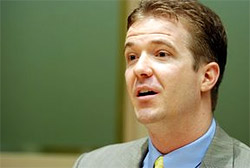
ERIC SAPP: Many of these candidates, especially the most successful ones, did more than just talk about their faith. The ones that far exceeded the national Democratic average and made even greater gains from ’04 effectiveness with Catholics, evangelicals, et cetera, were the people who started even up to a year-and-a-half ago with outreach. Many of the candidates started with listening meetings where they went to small, off the record meetings with pastors and lay leaders saying, “We want to hear what’s important to you.” Many times we’d go into meetings where traditionally Democrats would have thought, “These are conservative evangelicals; they’re not in our camp.” But we heard from pastors who said, “Where have you been? We are so happy Democrats are here talking to us.”
What made these candidates so successful was their authenticity. There wasn’t a set formula, and different candidates did different things depending on what was authentic to them. Some of them did Christian radio; a number of them gave speeches at evangelical schools; they created faith-targeted brochures, websites; did direct mail, built up lists of evangelical and Catholic voters – They did a lot more intensive and concerted outreach to that community, and we saw from the election that the community responded.
GREEN: Common Good Strategies was very active during the campaign. What were the other groups on your side of the political spectrum doing?
SAPP: In this election we saw a lot of groups at the grassroots, the 501(c)(3), (4) groups, mobilizing on issues – I don’t want to get sidetracked by progressive/conservative labels here – on different issues. Catholics in Alliance is a classic example. They pushed the U.S. Conference of Catholic Bishops voter guide that said you’ve got to vote on more than just abortion. Sojourners/Call to Renewal is another good example of a grassroots group that made a big difference. We saw that strategy pay big dividends. It also gave an opportunity for people in the faith community who wanted to be active but never felt they had a home on these issues to find one and get involved.
So the success came at different levels: You had candidates who were much more authentic, engaging, and willing to talk about their faith, and you also had a powerful movement at the grassroots and nonprofit level.
GREEN: There was a lot of activity among pro-family conservatives as well in 2006. The exit poll suggested the conservative religious voters showed up at the polls in relatively large numbers, contrary to some expectations. Charmaine, could you describe the range of activities that your organization engaged in during the campaign?
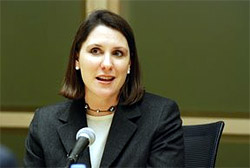
CHARMAINE YOEST: We were very focused on defending the right of people of faith to be involved politically. It’s interesting to see the Democratic Party paying more attention to questions of faith. Because those of us who, for a long time, have championed the right of people of faith to be involved in politics faced an onslaught this fall of books and articles talking about an alleged move towards a theocracy.
We spent a lot of time saying our public discourse is enriched by people of faith – Democrats, Republicans, whoever. In the hurly burly of democratic politics, we all need to be out there representing our values, letting the chips fall where they may at election time.
That was our ideological emphasis going through the fall. Coming into the fall in terms of practical politics, one of the things that we did was, given all of the campaign finance issues now, we reactivated our 501(c)(4). We are 501(c)(3), so we can’t talk about candidates specifically, although we always talk about issues.
Our (c)(4) component was energized going into the campaign season. In September we had a big event called the Washington Briefing. We’ve always had the Washington Briefing, but we moved it to the fall and made it a larger event than it’s been in the past. We had nearly 2,000 attendees, over 200 media outlets, and quite a few prospective presidential candidates coming to talk to values voters. We called it the Values Voters Summit. It was our way of kicking off the election season and saying, “This is an important election. Values voters need to be paying attention, and these are the issues they need to be looking at, and here are some of the potential leaders.”
A lot of people paid attention to the fact that Mitt Romney came and spoke and was warmly received, because they had been saying he wouldn’t be accepted by the values voters.
We went from there into having a simulcast, which is something we have been developing as a communication tool with our grassroots. We did that in Boston to emphasize this issue of religious liberty and the question of people of faith speaking out specifically about the marriage issue.
All that was in conjunction with the things we usually do: a daily update on the Web, a blog, email alerts, a radio program, a get-out-the-vote video. Our government affairs shop put out the True Blue Awards, which lets people know how their representatives voted on seven key pro-family issues.
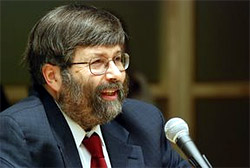
GREEN: There seemed to be a great deal of intensity among pro-family conservatives. What were some of the other groups were doing, beyond the Family Research Council?
YOEST: I don’t know that pro-family groups are any different than any other group out there these days. You see the trend of moving towards electronic communication.
GREEN: Were either of you involved in the state ballot issue campaigns this fall?
YOEST: We were very involved in working with state-level groups in both the South Dakota abortion fight and also in Missouri on the stem cell issue. We’ve also become more involved with video you can post on the Web. We produced a stem cell video in preparation for this election, and it’s definitely a model for something we’ll be doing more of in the future: putting out short three-to-six minute videos that groups can show in their homes or in churches.
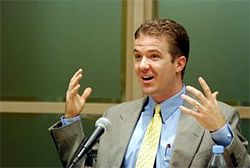
SAPP: I will tip my hat to the other side on two ballot measures that were taken off [the ballots] by some smart political strategizing in Oregon and Michigan. There was a predatory lending ballot initiative that had built up a lot of support in Oregon and a minimum wage ballot initiative in Michigan. In both cases, the Republican legislatures realized how powerful these [forces] were going to be and turned around and passed them – in one case, after eight years of blocking the measure.
The Republicans learned from their success with the marriage amendment. They took the issues off the table by passing them through the legislature, which, from the issues perspective, was great though it obviously removed a political arrow from our quiver.
GREEN: What about the minimum wage amendments?
SAPP: We were not directly involved in the one in Ohio, but those initiatives helped mobilize the grassroots and the nonprofits in defining what a values voter was in this election. They made it clear there’s a lot more to Christian values, a lot more to American values, than just a narrow definition of marriage and abortion. There was a lot more discussion about poverty, about living wages, in this election.
YOEST: You just used the word “narrow.” People seem to not pay attention when we talk about economic issues. Because our involvement in abortion and marriage issues is so contested and because those issues generate so much heat, we get more attention when we talk about them than when we talk about economic issues. It’s not that we are not concerned about minimum wage fights; it’s just that we have a very different opinion on how [a minimum wage increase] affects poverty.
The single-most important institution in this country for addressing poverty is the institution of marriage. Our argument is if you really want to look at structural poverty in this country, you have to look at marriage first and foremost.
So I want to take exception with how you define an economic issue.
SAPP: What we also saw in this election was a change in how folks talked about the abortion issue. All the Democrats who made strong gains were talking about abortion reduction. If you reduced poverty in this country by 10 percent, you’d see a 30-percent reduction in abortion. If you remove all late-term abortions you’re going to reduce it by half of a percent.
A lot of pro-life voters responded, saying, “Republicans have been talking about this for 25 years, and we’ve still got one in four pregnancies ending in abortion in this country. That’s a tragedy. We need to start working towards solutions instead of just using it as a political football that comes up every two years at Election Day.”
YOEST: That’s not fair – (laughter) – well, maybe I shouldn’t say unfair; it depends on who you’re talking about. What you said, about using the issue as a political football, is exactly what we’ve been arguing for years, so maybe there is some common ground.
SAPP: was not speaking to you all specifically but to the Republican strategy in general.
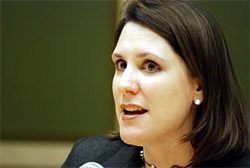
YOEST: Ideologically there is not a middle ground on abortion, but politically there are ways to find common ground. Eighty percent of the American people support parental notification. The argument we’ve made for years is, “Why doesn’t the Democratic Party come over to where the majority of the American people are?”
It may be a long time down the road before we agree completely on the absolute position of pro-life or the absolute position of pro-choice, but there are ways of practically changing the debate and looking at areas of reducing abortion. Most people don’t support second-trimester and third-trimester abortions, and that’s the regime that we have in this country today.
Somebody said this weekend, “It’s only a handful of pro-life Democrats, and they’re not going to make a difference in the Democratic Party.” But I would argue, as a political scientist, taking the long-term historical view, parties do change. There are realignments; there is issue migration.
I don’t completely rule out the Democratic Party. But even as Democrats won control of Congress based on more moderate, even conservative, Democrats coming to power, you saw Nancy Pelosi saying John Murtha may be the leader in the House. There is a disconnect between the issues that were on the agenda in the election and the leadership of the Democratic Party, which is made up of some of its most leftist leaders.
GREEN: One of the standard techniques faith-based groups have used is voter guides, particularly voter guides distributed in congregations. Was that an important tactic this time, Eric?
SAPP: I think so. What is so encouraging for me is the [nature of the] voter guides that were helpful to Democrats. Extending an olive branch, I’m not criticizing pro-life people or evangelicals, being an evangelical myself. A lot of the successful Democrats did not say in the voter guides, “If you are a Christian, if you believe X, Y and Z, then you have to vote on these issues and you have to vote for this party.” Instead, the push was for a more realistic, more scripture-based and gospel-based idea of Christianity saying, “Let’s get away from the pharisaical building fences around the laws; let’s go to a broader approach.”
Democrats will not to win the vast majority of evangelicals but perhaps they can lower the number voting for Republicans. But more importantly – and the reason I’m in this – it’s the right thing to do, to say, “Here’s what the Bible says; here’s what all your bishops say; you should be voting on these issues; you should be voting on more than one issue as a Christian.” People respond to that. It’s an easier argument, it’s a more effectively argument, and I think it’s the right argument. That’s why we’re seeing this shift back to a more balanced approach to the parties.
YOEST: You said you wanted to extend the olive branch, but I’m not sure who you’re talking about as being pharisaical.
SAPP: We saw some local groups putting forward voter guides that said, “If you are Christian, you have to vote first on this issue and this issue only, and everything else comes second to abortion or to marriage.” That’s not the way I read the Bible. We saw voter guides that say life issues are vitally important, but part of life is caring for the source of all life, so you can’t just be pro-life and then say, “But we’re not going to be stewards of God’s creation.” People responded to those broader arguments. Not to say that family issues are not vitally important, or that the life issues are not important to a number of these voters, but there are other issues as well.
YOEST: I can think of a specific instance: It was an image of a Bible, which I personally had removed. It wasn’t ours but I called this group and said they needed to be careful. We strive very hard to be clear that you need to exercise humility in how you define God’s values.
We both wrestle with this because we can’t be responsible for what everyone ideologically aligned with us does. You’ve got people on your side who do some stuff that is pretty horrendous in terms of saying what God’s values are.
But speaking for my own organization, I can tell you exercising humility is a very high priority. We do think there is a biblically based position on abortion, and I’m not shy about saying that, but you want to present that in a humble way and avoid talking about God’s values per se.
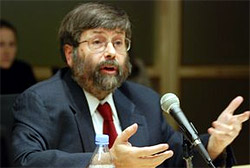
GREEN: One legal issue that arose during the campaign was the question of how tax-exempt organizations can be engaged in politics. How do you see the tax laws, and what impact did they have on your activities?
YOEST: We’re in a horrible situation in our political system today where we spend more time with our attorneys than practically anybody else during election season. It seemed like every time I turned around they were saying, “You can’t say that, you can’t that, you can’t say that.”
We’ve crossed the line into a free-speech zone; the system needs to be opened up more. With full disclosure of what we’re saying, what we’re spending, and what we’re doing, we could achieve more. We are at a point where we now have a 501(c)(3), we have a 501(c)(4); getting ready for 2008 we’re going to be looking at [forming] a PAC, a 527. A move towards more simplicity and more openness and disclosure would serve the people better.
SAPP: I agree with that. I just read that people spent more money in attack ads this campaign than in campaigns in past years, and that’s the reason we set up campaign finance [restrictions]. Clearly, we need to work on the laws. It is not helpful to have laws set up as they now, where most of the attack ads come from outside the candidate. To get back to more civility we need to get that money back into the campaign.
But as far as our personal experience, we don’t have to worry because we intentionally set ourselves up as a business so we could work directly with campaigns. There needs to be a recognition when you accept nonprofit status, you are saying, “I’m going to meet certain requirements.” I’m not speaking directly to Charmaine’s situation with the advocacy groups – there the laws just get really complicated – but especially with churches we do need to draw lines. I personally believe it’s very important for people of faith to be involved in the political process, and the Democrats we worked with communicated that. But there is also a point where pastors endorsing [a candidate] from the pulpit – and it happens on both sides – is inappropriate. A pastor has every right to stand up and say, “As a preacher, I endorse so and so,” but when they decide they want that right, they have to give up the tax-exempt status.
YOEST: There’s been such a chilling effect on pastors. Our experience has been pastors are afraid to be involved politically. They’re terrified of the IRS. We actually came to the defense of the pastor at All Saints Church in Pasadena. We didn’t like what he said, but we were horrified people came after him for having said it from the pulpit; we thought it was very much his right. He was talking about an issue, as I recall. He was not talking about a candidate. How have we gotten to the point in our country where we tell pastors they can’t talk about issues?
We should be having a vigorous debate from the pulpit; that’s what a pastor is for, to help the congregation interpret what scripture says. We have a disagreement about what the Bible says about abortion. Politically pastors should be involved in that debate, because that’s an important spiritual question.
We did recently hire a vice president of church outreach. That used to be a director-level position, and we just elevated it to a VP slot within our organization. We think it is so important to defend the right of pastors to be involved politically, and we understand they need some guidance about what they can do. We’ve partnered with the Alliance Defense Fund and in the spring each year we have a pastors’ briefing. We bring about 400 pastors to D.C. to talk about the issues and let them know if they follow these clear and easy-to-understand guidelines – not talking about specific candidates or endorsing candidates – then we will defend them if they end up in court.
It’s important for us to say to pastors, “You don’t stand alone; we stand with you, and we think you should be involved politically.”
GREEN: Eric, you said some labels used in politics to describe the role of faith and values are misleading. Could you expand on that?
SAPP: This election hopefully will change a lot of labels, beginning with “conservative,” “moderate,” and “liberal.” You’ve heard people trying to get their minds around it, and everyone tries a simple sound bite like, “The Democrats who won are more conservative.” Other people, pointing to the same Democrats, say, “No, they’re more liberal.” It’s yes to both. What you saw is a breakdown of the classic ideological divide that you’re either for marriage and against abortion or you’re for the poor and for the environment. A number of Democrats spoke in a much more conservative voice on abortion and family issues, but were also much more prophetic, more out there than Democrats have been in a long time on poverty, on the environment, on housing, and many of them took a more “liberal” position on Iraq.
A new kind of Democrat, a new kind of party, is emerging. Even Pelosi and some of the more liberal leaders are extending olive branches now, talking about these issues in a different way. What we saw were not Democratic values, not exclusively Christian values; we saw a lot of Democrats talking about commonsense American values. When they did that, they won.
We’re seeing a realignment towards the middle. People are saying, “We may have been on different sides in the past, but we can agree on a lot of these issues; let’s stop fighting over them and move forward.”
YOEST: Exit polls show conservative voters broke 20 percent for Democrats, whereas liberal voters only broke 11 percent for Republicans. To the extent you want to believe exit polls, there is some hard data demonstrating what Eric is saying.
If I can just interject a little spice into our interchange: You keep using the word “authentic.” That’s a concern of ours, the question of authenticity. You mentioned the DNC taking out ads on Christian radio –
SAPP: I was not talking specifically about the DNC; I’m not familiar with their efforts. I was talking about candidates who went on Christian radio themselves. I felt very comfortable with the ads of the seven or eight candidates we worked with: They were very different. It was not a formula of, “We start with this, we talk about this, we make sure ‘common good’ is in there.” They were ads reflecting what the candidates were comfortable with.
YOEST: Authenticity is important. That’s part of the message we were trying to communicate to the GOP ahead of the election: Values voters brought them into office in 2004 and didn’t see the authentic follow up in governing. Our message afterward is that the value voters of 2004 were the integrity voters of 2006. They said, “We voted on this in 2004, but we didn’t see a governing coalition on those issues.” The next two years are going to be fascinating because, as we both agree, the Democratic Party as a whole is not where you’re describing yet. It will be very hard for this handful of more conservative Democrats to make a difference in the national Democratic Party. We have said for years it was shameful the senior Bob Casey was not allowed to speak at the Democratic Convention [in 1992].
Ultimately our agenda is for both parties to advance the pro-life agenda. To the extent that the Democrats get that message, that is terrific.
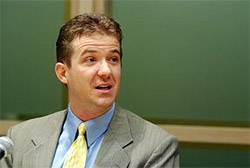
SAPP: You have 30 new members [of Congress], give or take, coming in, but it’s not as if the entire Democratic Party prior to this point was made of “San Francisco liberals”, so to speak. Even within the leadership, if Murtha is promoted up, his position on abortion is not the classic Democratic position. Probably the best example is Clyburn, who is from the South, the son of a fundamentalist minister, and very vocal about faith through his entire career. A number of Democrats in the last two years formed the Faith Working Group.
Instead of the old guard leadership saying, “We haven’t talked about faith real well; let’s poll it, figure out the message and get the talking points out,” they lifted up from within their ranks the people for whom this was authentic, who had been pushing for a long time for better engagement on faith, saying, “You all know this; you take the reigns and lead.” We have that happening among the old guard in the party, and we have a large number of freshmen coming in who demonstrated success, and people in politics listen to success. So I’m pretty optimistic.
YOEST: We’ll see what happens. We shouldn’t gloss over the radical nature of the Democratic Party. The subtext of what you’re saying is the Democratic Party has allowed itself to be captured by the radical left, in terms of partial-birth abortion and other hard-core leftist issues the party has advanced.
We’ve talked so much about the Democrats; we haven’t talked as much about the Republicans. But you see this same thing happening within the GOP, that the candidates who advanced a conservative pro-family agenda – with a couple of exceptions of course – were successful. You mentioned our voter’s guide: Among those [candidates] we rated 100 percent from a pro-family perspective on their voting record, 94 percent were reelected. The net result for the GOP was to move the party in a more conservative rather than more liberal direction. That’s an important message for both parties.
When you throw in the marriage amendments, where seven out of eight were successful, and when you look at marriage amendments as a whole across this country, every single time a marriage amendment has been on the ballot, it has averaged 70 percent support.
I don’t know if the political parties are going to get that message, because they both tend to be squeamish about addressing that issue, and yet the American people, when they have a chance to vote on it, support defending marriage overwhelmingly.
SAPP: If you look at Arizona, where the ballot measure failed, it’s hard to see a move towards the right because they lost when they went past marriage and went into civil unions. Many people saw that as much more extreme, a step away from protecting religion to imposing religion on law through the government. Same thing in South Dakota with abortion. Most people are comfortable somewhere in the middle, but when it went to that extreme they said, even in a very pro-life, conservative state, “No, we’re not going that far.”
People are avoiding going to the extreme divides of yes/no, your way or the complete polar opposite, and saying, “There is a significant ground in the middle; we’re tired of the ’94 and DeLay idea of winning with the fewest votes possible to show how extreme we can be; we want a middle ground.” I’d be very happy, as a Democrat, if Republicans continue to become more conservative because they are leaving this massive middle ground Democrats are very happily and effectively filling.
YOEST: He’s right about Arizona. I usually don’t address it because it gets into minutia, but Arizona was a different case than the other amendments. All amendments are not created equal, and there are some real specific reasons the Arizona amendment went down in defeat.
GREEN: The 2008 presidential campaign officially began on Sunday. (Laughter.) Where do we go from here?
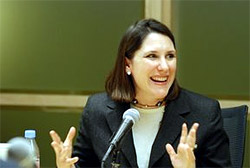
YOEST: I’m telling my team to take a long Thanksgiving (laughter). We need to take a breather, for a second at least, and then get ready.
It’s going to be fun, for those of us who are political junkies, to watch how this plays out. We’re in a fascinating historical time in our country. Jim Caesar, who was on my doctoral committee at the University of Virginia, analyzed the 2000 election in his book, The Perfect Tie. We like to talk about the great tide that brought in the Democrats, but we’re still basically at a tie. At our organization, we were sure there was going to be a week of recounts and attorneys [in this election], and I’m glad we were wrong about that.
We haven’t had a decisive moment here at all. Two-thousand-eight is right around the corner and a lot can happen between now and then.
The parties should know this conservative block of values voters can break a couple different ways. The GOP was tending to take them too much for granted. Some have come out afterwards and said, “They turned out as much, and they voted as much for the Republicans,” but I think that’s not a sophisticated analysis of what happened.
SAPP: Looking at the numbers, I’m hopeful. I played sports in high school and college, and I’m not one to trash talk; I preferred to point at the scoreboard. (Laughter.) So I will wait and see as well. But Democrats who did authentic, long-term engagement were very successful, and in three statewide races we worked on where Democrats had been doing outreach for over a year, they did 10 points better with weekly churchgoers than the Democratic national average, and eight points better with white evangelicals. As we get more sophisticated in these numbers, we’re going to see certain approaches worked. As a Calvinist – you know, fallen world – I think the party is interested in staying in power. (Laughter.) They will learn from these lessons.
YOEST: So what is predestined for 2008, Eric? (Laughter.)
SAPP: There we go – classic error. You’re confusing providence and predestination. Predestination is about salvation. But we won’t get into that. Not to make it too much of a joke, but I don’t think God has said, “This is my party.”
YOEST: I agree, Eric.
SAPP: We saw good-faith candidates in both parties coming out. If the result of 2006 is we have a broader conversation in the presidential election, if values voters or faith voters are more up for grabs, that is in the best interests of the church, in the best interest of the country, and strategically it is also something that helps the Democrats, since those voters have been going so heavily Republican for the last six years.
Democrats are going to have to move forward with this strategy in the future.
YOEST: Parties need to be really careful about saying, “There was only an X percent decrease.” “Only,” when you’re talking about millions of people, is a lot of votes. George Allen lost by four digits. We are very closely divided. Maybe authenticity is the word for today. Voters aren’t stupid; they do pay attention. In this day and age of instantaneous communication and instantaneous analysis, people don’t need to be spun. I get tired of the idea that we have to protect the voters from people telling them things.
The voters are more sophisticated than that.
The Internet gives us an amazing opportunity to communicate with people. Our thinking is to get information into people’s hands, get the voting record out there: “Here’s what they told you when they were in the campaign; here is what they did when they went to Washington. Now you decide. I don’t need to tell you; you just decide.”
GREEN: Would you all care to handicap the presidential races for 2008?
SAPP: Although I’m a not Baptist; I’m not a betting man. There are so many unknowns, not the least of which being what’s going to happen with bipartisanship rhetoric in the next year. Is it going to break down at the beginning of ’07, or are there going to be gains made? If Democrats learn the lessons from ’06 and implement them, they’re going to be in good shape because, as you said, when you’re talking about the evangelical vote or the Christian vote, these are massive numbers.
You do not need to have 20-point swings to have a huge difference. Just a statistic to put it in perspective, not to compare the two groups: If Democrats had won 3.5 percent of the evangelical vote Bush won, in real numbers that would have been the same as guaranteeing 100 percent African American turnout at the polls.
You do not need to have 20-point swings to have a huge difference. Just a statistic to put it in perspective, not to compare the two groups or set them against each other, but if Democrats had won 3.5 percent of the evangelical vote Bush won, in real numbers that would have been the same as guaranteeing 100 percent African American turnout at the polls.
Small swings can have huge effects on Election Day, and if Democrats do some of this stuff right, they can put a lot of the South and Midwest back into play. However, two years is a long time to go, and we’ll have to see how things shake out.
YOEST: I keep getting asked about evangelicals, evangelicals, evangelicals. The number-two person in our organization is a Catholic. If you did an analysis of who works for us, you’d find it is one of the most ecumenical organizations. It’s just astonishing to me.
We have high church, we have low church, we have Catholic: We’ve got it all. The media has asked us pretty much exclusively about evangelicals when in fact we work a lot with Catholics. You know the exit polling data on that: An awful lot of Catholics went home to the Democratic Party this time. We also have been working with black evangelicals.
There’s a lot of change going on out there, so to your question about 2008, I’m saying fasten your seat belts. This is going to be one of the most intense elections we’ve had in a long time, and that’s saying a lot because politics really has ratcheted up. I was listening to a radio program this morning that was replaying John Kerry’s – I refuse to call it a joke. Everybody has been focusing on the fact he insulted the troops by talking about studying so you won’t have to get stuck in Iraq. The radio show played the whole quote, and Kerry started out saying, I’m in the state of Texas, but the president is in the state of denial and deception.
We have gotten to a point of such disrespect in our political campaigning. Negative ads, and they are on both sides of the spectrum, really do impoverish us. I’m not optimistic about seeing it change; I think 2008 is going to be extremely virulent in that regard.
There will be an intense competition for the values mantle. We’ve been trying to communicate the message that the GOP doesn’t have a lock on it.
SAPP: On the last point about negativity: We need to change some of the rules to ratchet that down. I’ll put in a quick pitch for a former boss of mine, David Price, who passed the legislation requiring the face of the candidate and “I approved this ad.” That’s another reason to funnel more money through the candidate. If you’re going to go negative, it’s a lot harder to do when you are starting out saying, “I’m the one who said this nasty thing.”
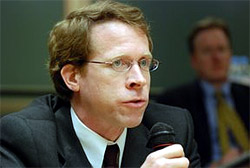
JOHN COCHRAN, CONGRESSIONAL QUARTERLY: What messages can be drawn not just about abortion but about life issues more generally from the election results? A number of pretty conservative anti-abortion, pro-life Democrats came in, but all of the referenda went down. From a practical point of view, where does the debate go from here?
SAPP: On abortion you are seeing a shift within the Democratic Party in the way they’re talking about the issue. Talking about abortion reduction is a very effective political step, but it also moves the discussion forward; it wasn’t just talk. In the House two different legislative packages were proposed that would have truly targeted many of the core causes of abortion. It would not completely end abortion, but it would do a whole lot better than we’re doing right now.
YOEST: We might have a definitional difference here because you shifted the terms when you started talking about causes of abortion. Are you talking about increasing funding to contraceptive-based sex-ed programs? That’s immediately where the Democratic Party wants to go, to completely shift the conversation away from partial birth abortion and second trimester abortion and parental notification. Those are issues people really do support, before you start mixing the message of sex ed programs with abortion politics.
SAPP: But the movement that has been successful is combining messages. The bills have improved funding for adoption services, improved notification issues, and they have sex ed – it’s both/and. It’s common sense that unwanted pregnancies are why people have abortions, so if you can reduce unwanted pregnancies, you’re gong to reduce abortion. But that doesn’t mean you just give kids condoms and teach them how to use them. I’m pretty sure the pro-life Democrat package also had significant funding for abstinence [education] – which we all know is the most effective way to reduce unwanted pregnancies.
Instead of saying it has to be only this or that, it’s saying, “Let’s all come together and move forward.”
YOEST: Could we have it on the record that Eric said “we all know abstinence is the most effective way?” (Laughter.)
SAPP: Definitely.
GREEN: Charmaine, what about the other life issues, beyond abortion?
YOEST: We were very disappointed in the result in South Dakota and in Missouri, particularly in Missouri because there was so much deception involved. I just talked about the voters not being stupid, but the voters do need to have the correct information in their hands, and there were a lot of people who did not understand the amendment.
We did lose on that, but the amount of money that went into the race – $30 million on the other side. We were outspent, maybe 30 to 1, and there was Michael J. Fox.
The fact it was as close as it was indicates the issue is very much on the table. I don’t see that as being a resounding victory for the stem cell side, the cloning side, at all, given the extenuating circumstances in that race.
SAPP: If someone says the election shows this ideological bent is now completely dominant, they’re not reading the numbers. Again, we’re looking at a different kind of candidate from within the Democratic Party, possibly a move back from some of the extremes in the Republicans. More importantly, the voters are saying, “I want more than just the either/or solution.” You have lots of the marriage amendments winning, which shows a number of voters care deeply about classic family values.
The Democratic move on abortion shows clearly this is something voters care about and wrestle with, and they should. We all know stem cell research is a difficult issue on a number of levels, and we should be wrestling with it.
YOEST: With stem cells, it’s still such a nascent debate. We very much have the facts on our side on that issue, but it’s a difficult issue to get out there. That’s one of the reasons we did the video: People have this instinctive panic when you bring up the issue because they think it’s complicated. It’s not that complicated, but it does have some technical elements to it.
From a communications perspective, it is a challenge we spend a lot of time talking about. How do we get the facts out there in the easiest way possible for people who don’t want to spend a lot of time thinking about pluripotency? Honestly, our experts on this issue keep coming up with those $10 words. (Chuckles.)
The fact it was so close is encouraging to me, and you’re going to see a real evolution in that debate as we continue to clarify and refine and communicate what the real issues are.
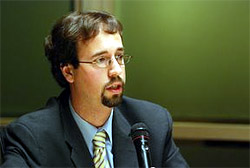
DAN GILGOFF, U.S. NEWS & WORLD REPORT: Charmaine, what’s the general mood in the conservative Christian movement in light of the defeats, such as Senator Santorum or John Hostettler; the Missouri amendment succeeding; the South Dakota amendment failing, and the parental notification ballot initiatives in California and Oregon?
After 2004 there seemed to be such a euphoria about what was possible with gains in the Senate, Bush’s re-election, and the role values voters played in the election. Is there now, conversely, a moment of crisis? Is the movement reexamining the strategies, tactics or ideology employed over the last couple of years?
YOEST: Anytime you win, it’s better than losing. That’s true. But a lot of times people underestimate that we’re here to play and that we are fully aware politics ain’t beanbag. Nothing is all about one election. Two-thousand-eight is right around the corner. So you’re tired, you take Wednesday [off], have a little Elijah moment, and you pick yourself back up and go back at it. We’re very, very geared up for 2008. Dave Kuo talks about taking a fast from politics and values voters being disillusioned prior to the election, but we as a community believe it is a responsibility to vote.
Both political parties need to understand it’s a highly motivated constituency. The question is how are they going to vote? They are going to pay attention. We’ve said the values voters of 2004 were the integrity voters of 2006. They expect the people they elect to represent them and carry forward the issues they were elected on. We didn’t see that as much as we would have liked.
GILGOFF: Are there any lessons you felt your organization or the movement learned? Would you have done anything differently? Or do you lay the blame squarely at the feet of Republicans who didn’t deliver on the promises of ’04?
YOEST: What we would have done differently? We see it more as our role to educate people and to hold the political parties accountable. We look at it very much as a communications effort getting ready for 2008. I guess the lesson from Missouri, where we were outspent 30 to 1, was that we will be paying a lot of attention to having the resources we need to play on this playing field.
SAPP: Are you sure there aren’t any more ultra-specific strategies for ’08 that you’d like to share with us? (Laughter.)
When a group that voted 40 percent for Bush switches from being a Republican base to a swing constituency, whew, that’s huge for the Democrats moving forward. It is appropriate that these votes are now more up for grabs because the interests of a party are never lined up perfectly with the interests of the church, and voters are recognizing that. This will help Democrats as faith voters move back to a more balanced perspective.
YOEST: If these integrity voters are going to be able to hold their elected representative accountable, they are going to have to have information. If you’ve got Democrats who are saying, “We are conservative, we’re pro-life,” then we expect the Democrats to deliver on that. People don’t know Nancy Pelosi, they don’t know John Murtha, and we will make it our business to make sure they do.

KEVIN ECKSTROM, RELIGION NEWS SERVICE: You said you were disappointed in the last two years that values voters put these guys in office in ’04, and then they squandered their opportunity. But what didn’t you get? You got a vote on gay marriage – it didn’t pass, but you got the vote; you got Alito –
YOEST: Yes, but why didn’t it pass? Let me go back to the word I used earlier, which is “squeamish.” Seventy percent of the American people, when they have a chance on this issue vote for it, so why do you see politicians across the board – Republican, Democrat, Green, whatever – unwilling to talk about it? It’s not that complicated: There were people who didn’t show up for that vote. There wasn’t a lot of party discipline on the vote, so –
ECKSTROM: You had a majority in both houses, you got two pretty conservative Supreme Court justices. What could they have possibly done that they didn’t do? You can’t blame Democrats for not delivering the vote because the Republicans had the majority.
YOEST: We didn’t blame the Democrats, except that we’ve always tried to highlight the radicalness of their national agenda.
We’re just looking for more of an emphasis on pro-family issues – not just having “Values Week” in Congress. There was a lack of a willingness to champion the issues. But politics is a complex game. If you go back and look at the statements we made, we did give the Republicans credit for two conservative Supreme Court justices; we are concerned about the future of the Supreme Court at this point. Yes, there were definitely some victories; we say we’ve won some, we’ve lost some. We don’t see this as an either/or proposition; it’s a game of nuance, and that’s another reason we are here in Washington, D.C. What we try to communicate to people is if you want to be involved in politics, you need to do it in a sophisticated way.
SAPP: When we listened to these traditional values voters, we heard a lot [of criticism about] the priorities of [elected] Republicans, who had all these ballot initiatives on traditional values and yet spent all their political capital on tax breaks for business. What they spent their time on was very different from what they talked about with voters. A lot of people we talked to were just fed up with that.
We give this analogy: When Jesus was asked what is the greatest commandment, he said first to love your Lord God with all your heart, mind and soul; the second is to love your neighbor as yourself. Democrats have been the party of the second great commandment, but they have been so ineffective at passing the bar on the first that a lot of these values voters said, “We’re not going to give you credit for any of the second commandment stuff.” When Democrats started being more authentic, talking more openly about their faith, making it clear they welcomed people who believed in God and loved the Lord God with all their heart, they then started getting credit for all their second commandment achievements.
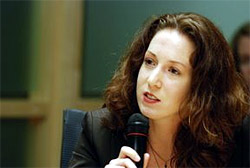
AMY SULLIVAN, WASHINGTON MONTHLY: Charmaine, you bristled at the idea that the Family Research Council and other groups on the right have a narrow focus on abortion and marriage and said you’d like to get credit for position on things like poverty.
I hear the same thing from some pro-choice groups when they hear about the abortion reduction approach to the abortion issue. They say, “We’ve been talking about the need to prevent unintended pregnancies all along.” While it may be literally true that the point is somewhere on their website, it’s usually around point number 18 or 19. So there’s a reason why they don’t get credit for it.
At the Values Voters Summit, all the material I saw focused simply on abortion and marriage. In the letters I saw from a couple of organizations going out to conservative pastors, those were the two main issues. When groups like Catholic Answers put out their voter guides, they didn’t include poverty and other issues.
What could you or other conservative organizations do to get more attention for the other issues you focus on?
YOEST: It’s a question of resources and time; I’m sorry to give you a nuts-and-bolts answer. Sometimes people underestimate how much manpower it takes to be involved in these national-level debates. Part of my frustration is people expect you to be everywhere on every issue, and issues come up that we want to talk about, and we’ll look around the table in our senior staff meetings and say, “Who is going to write that?” You don’t want to write something that isn’t substantive.
We do have a tax paper coming out at the new year, and I would love it if you would write something about it. (Laughter.) As the vice president of communications, it is going to be so much harder for me to get anybody to pay attention to it than when we talk about marriage and abortion. It takes me two, three, four times as much effort, and so when my phone is ringing off the hook with people wanting a statement in defense of marriage, which is a top issue for us, that takes up an entire day. That’s the nuts-and-bolts reality of politics.
To your point about the briefing, we have had quite a few people say things like that to us, and one of the reasons I bristled is that, if you went through our resource area, there were a couple of different poverty-related organizations there. If you go to our website, we’ve got pictures. As an institution it was hard for us in the aftermath of Katrina because Tony wasn’t around. He was down working on hurricane relief.
We’ve been very supportive of faith-based initiatives because we believe the church is the most effective anti-poverty institution. First, marriage then the church. It’s not that we don’t emphasize poverty; it’s that we have different answers than Eric. I don’t think the government is the most effective anti-poverty approach. If you succeed with your minimum wage initiatives there are going to be some unintended consequences. I disagree with you politically on that issue.
Going back to being Miss Ph.D. Political Science, it’s tough being a conservative who doesn’t think government is the answer because then you get accused of not caring. We care; we just have a different way of approaching it.
SULLIVAN: Would it be fair to say your organization has put the majority of its resources and staff time towards those two issues?
YOEST: No. It’s also cyclical. It depends on what’s going on at any one time, so no, I wouldn’t say that at all.
Going back to the international issue, we spent three weeks on the Abdul Rahman issue, which was an international religious freedom question. Some of what we do is proactive; for example, we’re investing resources in this tax analysis, and other times it’s a response to something that comes up. We end up doing a lot of quick response and our policy stuff is longer term.
SAPP: There’s a difference between a non-profit advocacy group and candidates, but there is the same issue of limited resources for candidates. In the speeches Casey, Strickland, Sherrod Brown, Jennifer Granholm gave, though, they made a big point, especially in their faith-focused ones, of covering a wide range of issues and also of putting some unexpected things up front. That is a good way to get press attention. If Family Research Council came out with a massive report saying the environment is a big issue, and we need to deal with it, people would respond to that.
What we’re seeing with the Democrats is a wider range of issues, a movement to a broader base of American values. People respond to that because they want it to be about more than one or two issue on either side.
YOEST: I’m sorry, I just thought of something. We had an article on global warming in Human Events this last week – on Tuesday, on Election Day. But I don’t think you’re going to give me credit for it because you won’t agree with what we said in it. (Laughter.)
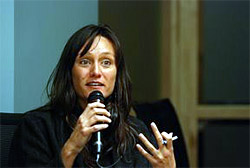
RACHEL MARTIN, NATIONAL PUBLIC RADIO: I’m interested in how foreign affairs and domestic politics intersect. This was a fascinating election because there are a couple of wars going on. A lot has been said about this election having been a referendum on the administration’s handling of the war.
How did your organizations take that into account? Do you agree with people who say values issues cannot be the mobilizers they have been in previous elections because of the war?
SAPP: When people try to come up with a nice, simple package, they’re going to get it wrong. If anyone is looking for proof it wasn’t just about the war, Joe Lieberman is the obvious example. He was one of the most pro-war people in Congress, and he won. If that was the only issue, he would have been defeated in a landslide, and he wasn’t.
Having said that, [the war] clearly was a big issue. Going after values voters has to be a package: talking to them, building relationships with them so you can deal with different issues that come up. The war was definitely a mobilizer for a lot of the grassroots, non-profits on the more progressive side, the more peace-focused groups like Sojourners and some of the Catholic groups. In that sense, it played a role in mobilizing values voters on the left. But it was just one of many factors that contributed to this change in the election.
YOEST: Our president is – I’m told you should never say “a former Marine.” He is a Marine. (Laughter.) One of the guys on my team is a not-former Marine. We have personal interest in military issues from that perspective. Our slogan is family, faith, and freedom, so we don’t talk about military issues as much, but we have been supportive of the war. It comes out in our writings, typically more focused on trying to be supportive of the troops.
One of our Witherspoon fellows has just come back from serving in Iraq, and he recently wrote an op-ed in The Wall Street Journal advocating for more troops. He was invited to testify in front of the Senate Foreign Relations Committee last week. We had him in to talk about that question at FRC last week.
Our policy is very pro-troops, pro-war, but in terms of the details – I wouldn’t say we are uncritical, but we haven’t spoken out much about it.
COCHRAN: There was a sense before Election Day we were building toward an important confrontation over the question of the proper role of churches in politics; a lot of lawyers were mobilized on both sides. Can we expect a confrontation coming out of this election? Were there some cases out there we should be watching for? If not, why not?
SAPP: The only ones I’m aware of were cases where it was a very clear violation; a pastor brought a candidate up and said, “This is the person I’m voting for, and you should vote for him.” The IRS situation at All Saints Church is tragic. Pastors should be able to talk about issues. It seems the law is pretty clear on what a violation is – you can’t say certain words.
You have many folks who are doing due diligence making sure churches are given the opportunity to engage on the issues. Some of these groups on the left, I would say, are too extreme in going after churches. They don’t do us many favors when they file lawsuits because it gins up the religious right base, who say, “We’re being attacked.”
YOEST: That is part of the reason we have our pastors’ briefing: because it isn’t that complicated. They are very few actual cases, but they get so much attention it tends to scare pastors. Even when somebody makes a clear infraction that was really obvious, it still scares somebody who might have pursued things in a wiser way.
We don’t see it as a case of pastors running rampant.
SAPP: It does seem there were a number of pastors’ groups on the right that skirted the edge legally, while it was like pulling teeth trying to get pastors to engage on the left. This is a squashing of discussion that carries across both sides. But in my experience it has even more of a dampening effect in the progressive faith community, where there is a stronger tradition of what they would call the separation of church and state.
GILGOFF: Eric, Democrats were given a gift in the form of Republican scandals. Talking to Democratic pollsters, that’s what really did it for values voters, particularly after the Abramoff and later the Foley scandals. That’s going to be hard to replicate – impossible to replicate.
YOEST: Let’s hope it’s impossible. (Laughter.)
SAPP: There is no question the scandals hurt the Republicans and helped the Democrats. But again, it’s a little more complicated than that. For one thing, and we may have disagreements on this, I think the scandals were the natural outcome of the Republican rhetoric and strategy that was fundamentally flawed. That strategy had been effective at mobilizing four out of five values voters for Republicans, but that strategy was doomed eventually, and now it has crashed and burned. It will also be harder for the Republicans to win some of these folks back.
But it was definitely not just about Republican failures. We would not have seen the swings we did had Democrats been operating under their old strategy. When you look at states like Michigan and Ohio and Pennsylvania, where there was long-term concerted outreach, you see very significant differences over the national average – 10-point advantages.
We were in parts of the states where we had never been before as a party, talking to communities we have never spoken to before, and now we have lists of 500, 600 pastors that have personally met with Democratic leaders. We have got targeted lists; we have got marketing lists. This is an infrastructure that will move forward and be very helpful in the future.
YOEST: The other thing we’re keeping in mind is historically this wasn’t a big surprise. In fact, some of the numbers are saying the Democrats didn’t do as well as they might have in terms of turning over. It goes back to the point of living in a real world of real politics. These swings happen.
And scandals happen in both parties. We can all laugh about it not happening again, but we all know it will.
This transcript has been edited for clarity, style and grammar by Andrea Useem.


